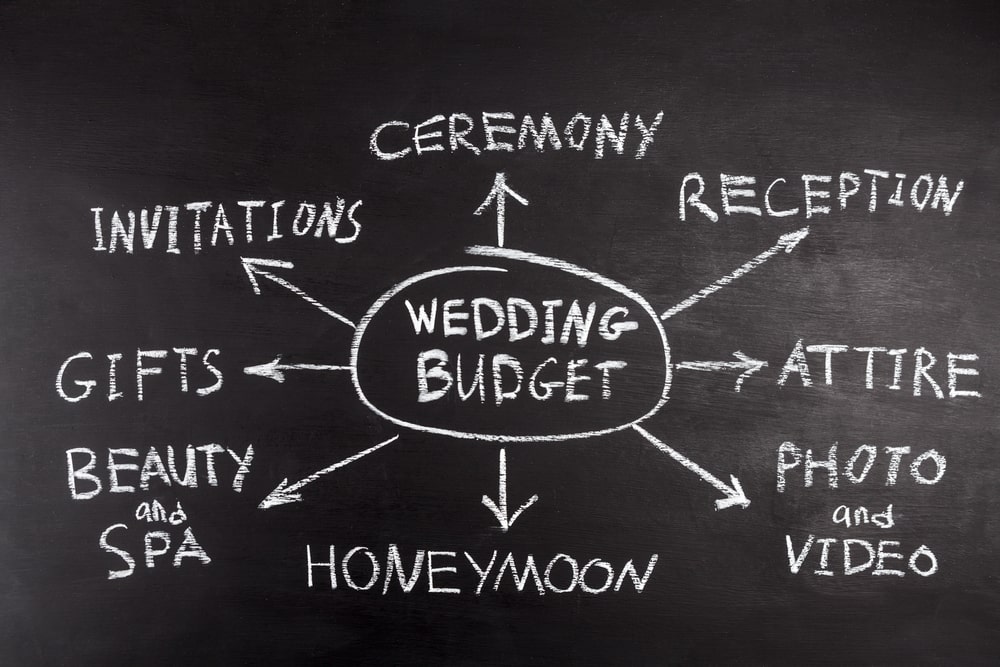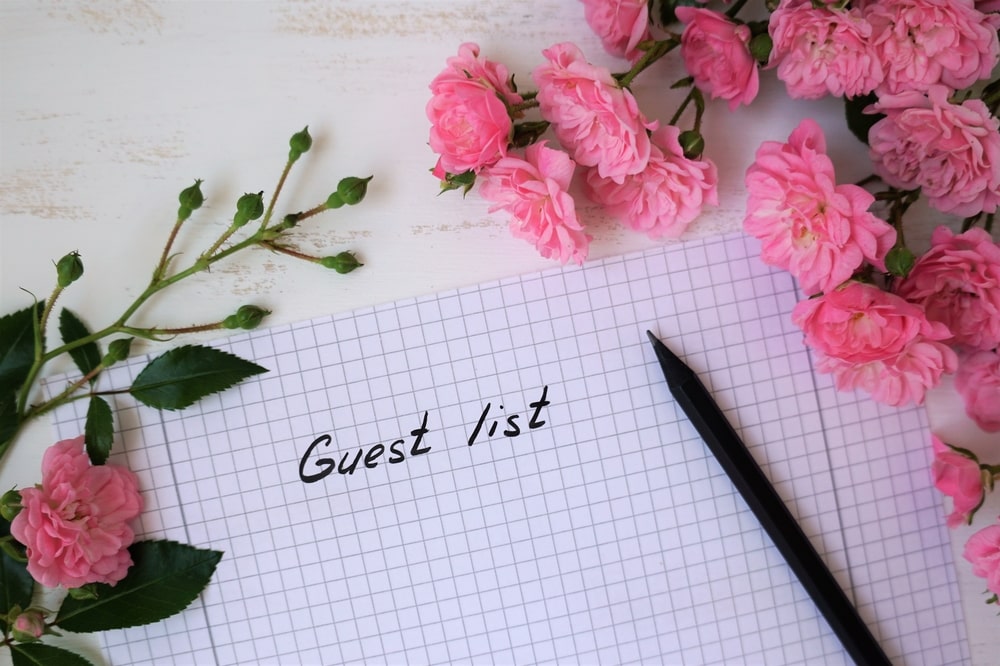Planning a wedding is an exciting but daunting task. From deciding on a venue to picking the right wedding dress, you’ll want to make sure you get every decision right. One of the most important considerations is deciding who to invite to your wedding.
With so many family members, friends, and colleagues to consider, it can be difficult to know how many people you should invite. To ensure you don’t make any costly mistakes, this guide will help you understand the factors involved in deciding how many people to invite to your wedding.
Figure Out Your Budget
When planning a wedding, budgeting is one of the most important pieces of the puzzle. It can be difficult to determine how much money you should be allocated to different areas of your wedding, but understanding the average wedding budget breakdown can be a significant starting point for creating a guest list.

Doing this will also help you have a clearer picture of what you want to prioritize. Once you know what aspect you want to splurge on, you will be better positioned to know who you can and want to invite to your wedding.
Reception Venue, Catering, & Rentals & Floral (40%)
Your reception will likely be the most expensive part of your wedding. This budget should cover the cost of the venue rental, catering (including meals and beverages), rentals (such as linens, flatware, tables, and chairs), and any other miscellaneous charges from the venue.
Photography and Videography (12%)
This budget covers photography and videography services and products, such as prints and albums.
Reception Music/Entertainment (10%)
If you plan to have live music or a DJ for your reception, this is where it fits into your budget. This part should include additional costs of hiring entertainment, such as dance floor rentals or sound systems.
Transportation & Gifts (15%)
Wedding favors, gifts for the wedding party, welcome bags, dessert, and transportation services are also important to consider.
Wedding Attire (9%)
Your wedding attire (including bridal gowns, suits or tuxedos, dresses for the bridesmaids and groomsmen, and other accessories) will typically take up 9% of your budget. You should also save money for alterations and special pieces like veils or headpieces.
Favors & Gifts (2%)
These may include a personalized token, something symbolic, a traditional keepsake, or even something that reflects the couple’s interests. Whatever the form, these gifts serve as a way of saying ‘thank you’ and expressing appreciation to the wedding attendees and special members of the wedding.
Cake (2%)
The cake usually takes up around 2% of the total budget. This section includes not just the cost of the cake itself but any decorations and accessories like cake toppers and stand rentals.
Emergency (10%)
It’s important to set aside a percentage of funds for emergencies that may arise during the wedding. As you strive for perfection, you may have miscalculated an area, and the emergency fund will come to play.
Why Make A Wedding Budget First
Gives You the Average Guests You Can Invite
An estimated budget can help determine how many guests you can invite. It’s also important to consider how much money you can reasonably spend per person when deciding the number of guests.
What Wedding Size Fits Your Budget
With a budget in mind, you can determine what kind of venue will accommodate the number of guests you plan to invite and determine what kind of food, drinks, and decorations you can get with your money.
As celebrity wedding planner Colin Cowie notes, “How many people do you need to have (both sides of the family and mutual friends) and how much can you afford to spend? Your budget usually dictates how many people you can have”.
Estimate the Number of Guests to Invite
There are several factors to consider when deciding how many people to invite to your wedding. Consider the number of people who need to be invited and the number you can realistically afford.
Consider Your Budget
First and foremost, it’s important to consider your budget. Depending on how much you have to spend, this will often dictate the number of people you can accommodate. The size of your venue and the amount of space available for seating also directly impact how many people you can fit. As you consider your budget, it should go hand-to-hand with the venue you have set.
Create a Preliminary Guest List
Once you’ve established your budget and the size of your venue, the next step is to make two preliminary guest lists – one for those that must be invited and another for those that could potentially be invited depending on budget and space.
Once you’ve identified who should be invited, it’s important to send out RSVP cards at least six to eight weeks before the event so you can get an accurate count of attendees. Be sure to include a pre-stamped envelope with your RSVP card so guests can easily reply. After your requested “reply by” date has passed, a few phone calls may be necessary to get an accurate final count.
Use Online Tools
Using online tools such as wedding planning websites and social media can also be a great way to estimate the number of guests you can expect. One of the most popular is WeddingWire, a free website builder with extensive planning tools, including budget trackers, checklist organizers, and seating chart makers. However, WeddingWire does not offer options to match its website to invites or stationery.

Your Ideal Wedding Size In Creating the Guest List
You must consider your ideal wedding size as you create your guest list. The size of your wedding can vary greatly depending on your family size and budget.
If you have a smaller budget and want to invite many people to your wedding, finding ways to personalize your day with the extra fund will be challenging. However, if you have a larger budget but want to keep your guest list small, spending on vendors and personalizing your day will be more flexible.
Here are some definitions for various wedding sizes to consider.
Elopement
Elopements usually involve a little travel, an epic location, and an intimate crowd of 5 guests or fewer. Typically, the couple opts for an exchange of vows with little to no fanfare.
Minimony
A minimony is a commitment moment among the couple and up to 50 guests before planning a larger reception or celebration later.
Micro Wedding
These intimate affairs typically involve less than 20 guests. They are more laid back and are different from an elopement in that they still involve the traditional elements of a wedding.
Everything you would expect in a bigger wedding, such as decorations and catering, is included, but on a much smaller scale.
Small Wedding
Small weddings generally include between 100 and 120 guests. These weddings often involve many traditions you would expect in a more traditional ceremony, but on a smaller scale.
Medium Wedding
Medium weddings typically have between 150 and 200 guests in attendance. These are perfect for couples who want to keep it a bit more intimate but still honor their loved ones.
Large or Grand Wedding
If you want to host over 300 guests, a large or grand wedding is the way to go. This type of event may require more staff and additional decorations.
It requires a lot of planning, so give yourself ample time to organize it and secure any necessary vendors well in advance.
No matter what size wedding you decide on, it’s important to remember that this day is about celebrating your love for each other and your commitment to a lifelong partnership. When you focus on the day’s purpose, making decisions about the size of your wedding will become much easier.
Finalize Your Guest List

Average Evaluation
It’s important to remember that the size of your venue should always determine the size of your guest list. The average wedding has 136 guests and, an average budget of $36,000, an average cost per guest of $265, though that cost varies vastly by location and seasonality.
The average wedding guest list comprises family and close friends, so list everyone you’d like to have on your big day. It’s important to be mindful of your budget and ensure enough room in the venue for everyone.
Guests Special Role
You should also think about any special roles you’d like your guests to play in your ceremony or reception, such as readings or performances, making the breakdown easier.
Familial Relations
Once you have your list, it’s time to start whittling it down. Try to prioritize who you want there the most, and make sure to keep in mind any family dynamics or politics that may come into play when deciding on the size of your guest list.
It’s okay to be honest about who is important to you and keep your budget and space manageable.
It’s also worth noting that if you decide to go with a smaller guest list, it doesn’t mean you have to leave anyone out – it’s perfectly acceptable to have a more intimate wedding and then celebrate with a larger group at a post-wedding gathering.
FAQs
How many guests should I invite to my wedding?
That is entirely up to you! Having at least one guest for each person at the wedding party and family members is a good idea. Couples typically have between 75-250 guests at their weddings, depending on their budget, style, and personal preferences.
What percentage of wedding guests attend?
Attendance rates vary widely, but about 70-80% of wedding guests tend to attend on average.
How many wedding guests is normal?
The size of the wedding really depends on the budget and the size of the wedding party you’re going with. A general guideline for an average wedding would be about 75-250 guests.
Is 100 guests a small wedding?
Yes, typically, 100 guests are considered a smaller-sized wedding. However, what is considered small or large depends on the couple’s personal preference and budget.
How many people does a bride invite to a wedding?
The number of people the bride will invite will vary depending on her personal preferences, budget, and the size of her wedding party.
Can I invite more guests than my venue can accommodate?
It is important not to exceed your venue’s capacity for safety reasons. If you want to invite more guests than your venue can accommodate, you should book a larger venue or make alternative arrangements.
Can we limit the number of plus ones allowed?
Absolutely. Many couples set a limit on the number of plus ones they can invite. This rule can be an effective way to keep the guest list manageable.
Curated Events will help you simplify the decision-making process by suggesting an event design that reflects your style – whether it’s garden, classic, modern or any other style-We’ve got you covered! Contact us today and get the ball rolling on your dream wedding.

